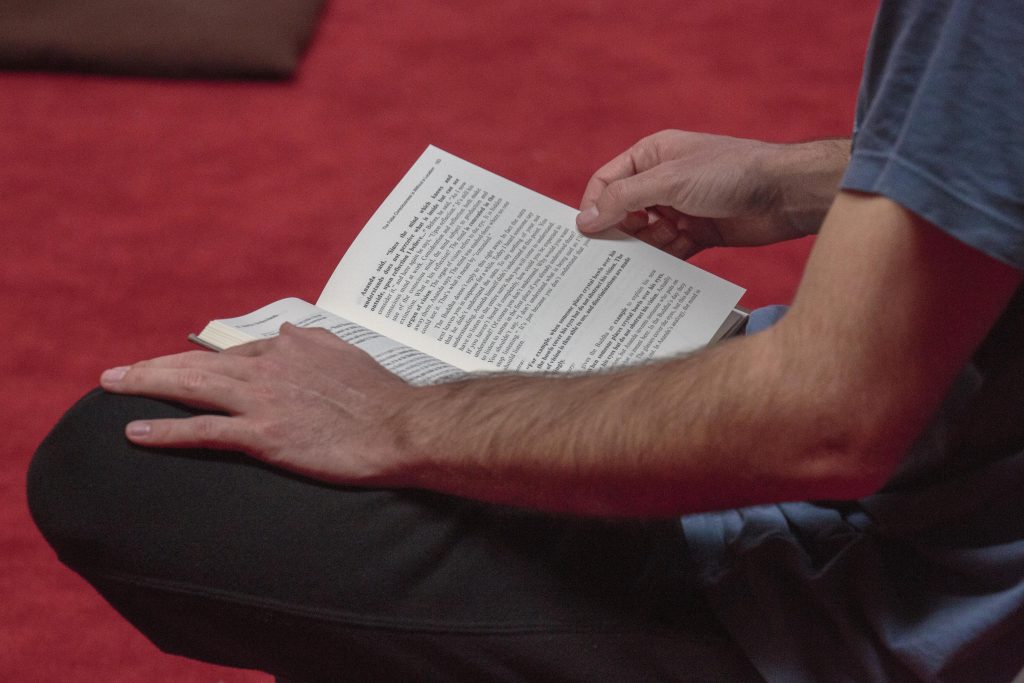Statement on a Classics Curriculum
Humanity's Rich Legacy of Thought
At DRBU deep engagement with primary texts from both East and West and an integrated approach to learning constitute the core curriculum. The seminal and abiding works of both provide a solid foundation for understanding the ideas, values, and ethos that govern contemporary life and shape the interconnected world in which we live. What have come to be known as the “classics” represent humanity’s rich legacy of thought, debate, and insight into the abiding issues that confront humankind.
The seminal texts of both Eastern and Western traditions continue to shed light on the persisting inquiries, challenges, and possibilities of human existence. They come embedded with sophisticated methods of deep questioning, testing, and affirming. The highest inspirations and cautionary limitations of the human condition find their clearest and most thoughtful expression in these enduring works. Because they are both timeless and timely, when engaged deeply through close reading, genuine discourse, and embodiment, they tap into deeper sources that stimulate fresh insights into our contemporary problems and into ourselves. Far from being outdated or impractical, they are a bedrock that can provide students with a strong foundation for lifelong learning, discovery, and leadership in any field or specialty.
The classical sources that form the heart of a liberal education are neither homogeneous nor monolithic. They encompass a diversity of approaches and experiences. They cover a vast expanse of knowledge, questions, and ways of knowing that bridge past and present and that prepare students to engage the crucial issues of the day and to thrive in a changing world.
These works do not so much impart “Truth” as inspire a pursuit of truth—and convey the methods, pitfalls, and excitement of that search. They also remind us that genuine learning begins with curiosity and is sustained by questions. Searching for answers often entails doubt and a healthy unsettledness. While the writers may widely differ in views and beliefs, they share a common stance: earnestness for serious probing and an uncommon quest for authenticity.
People wish to be settled; only as far as they are unsettled is there any hope for them.
To achieve the broad sweep of a liberal arts education informed by traditions both East and West, DRBU extends the Western classics legacy to include wisdom traditions of Asia. We view these two approaches as complementary and mutually compatible, not as contradictory opposites. Both aim at liberation and have at their base insights into human nature, the workings of causality, and the complex interconnections between the individual, social, and natural dimensions of existence. Together they offer multiple perspectives on the human condition in all its complexity, potential, nuance, and diversity.
When their constitutive works are read deeply and studied slowly, they tell us not only who we were, but provide fresh insights into who we are and might become. They retain a power to stimulate us by calling our attention both to abiding patterns and to new possibilities. We maintain that this potential for insight and meaning is not the limited domain of one tradition. Rather it belongs and pertains to any sincere and authentic body of thought that still retains its liveliness and purchase over centuries and millennia.

At DRBU, classical texts are studied in integrated curricula that weave together multiple curricular strands. DRBU’s BA and MA programs are integrated in that their curricular strands are not stand-alone modules each advancing a compartmentalized area of study, but are intertwined threads (or ‘strands’) of a tightly woven fabric that as a whole result in a unified and requisite set of knowledge and intellectual skills. Therefore, each of DRBU’s programs has an all-required and sequentially-built curriculum. These characteristics invite students and professors to reference all other parts of the curriculum pertinent to discussions and extend the circle of their conversations beyond the classroom into other parts of their lives at DRBU.
Overall, an integrated curriculum centered on classical sources continues to offer students one of the best vehicles for stimulating the qualities of intellect and character that we consider to be hallmarks of an educated person. Such individuals bring a probing examination to the present informed by a sense of the past. They are attentive to workings of causality and alert to connections among seemingly separate phenomena. Having explored diverse perspectives and insights into human nature, they are at ease in the wider world and able to entertain ideas and outlooks other than their own. They exhibit a capacity for self-reflection that refines their sense of ethical responsibility. The breadth of a liberal arts curriculum is purposeful as it strives to develop a well-rounded person whose appreciation of the natural world is enhanced by knowledge of science and the arts and who finds pleasure in art, music, and the aesthetic richness of life.